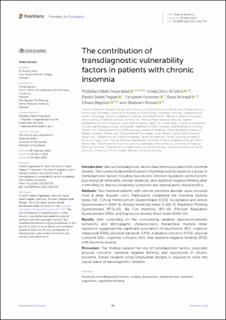| dc.contributor.author | Habibi Asgarabad, Mojtaba | |
| dc.contributor.author | Hoda, Doos Ali Vand | |
| dc.contributor.author | Pardis, Salehi Yegaei | |
| dc.contributor.author | Farzaneh, Hooman | |
| dc.contributor.author | Reza, Ahmadi | |
| dc.contributor.author | Chiara, Baglioni | |
| dc.contributor.author | Moradi, Shahram | |
| dc.date.accessioned | 2023-11-17T14:01:13Z | |
| dc.date.available | 2023-11-17T14:01:13Z | |
| dc.date.created | 2023-03-14T10:25:46Z | |
| dc.date.issued | 2023 | |
| dc.identifier.citation | Habibi Asgarabad, M., Doos Ali Vand, H., Salehi Yegaei, P., Hooman, F., Ahmadi, R., Baglioni, C. & Moradi, S. (2023). The contribution of transdiagnostic vulnerability factors in patients with chronic insomnia. Frontiers in Psychiatry, 14, Artikkel 1162729. | en_US |
| dc.identifier.issn | 1664-0640 | |
| dc.identifier.uri | https://hdl.handle.net/11250/3103304 | |
| dc.description.abstract | Introduction: Various transdiagnostic factors have been associated with insomnia severity. The current study aimed to predict insomnia severity based on a group of transdiagnostic factors including neuroticism, emotion regulation, perfectionism, psychological inflexibility, anxiety sensitivity, and repetitive negative thinking after controlling for depression/anxiety symptoms and demographic characteristics.
Methods: Two hundred patients with chronic insomnia disorder were recruited from a sleep disorder clinic. Participants completed the Insomnia Severity Index (ISI), Clinical Perfectionism Questionnaire (CPQ), Acceptance and Action Questionnaire-II (AAQ-II), Anxiety Sensitivity Index-3 (ASI-3), Repetitive Thinking Questionnaire (RTQ-10), Big Five Inventory (BFI-10), Emotion Regulation Questionnaire (ERQ), and Depression Anxiety Stress Scale (DASS-21).
Results: After controlling for the confounding variables (depression/anxiety symptoms and demographic characteristics), hierarchical multiple linear regression suggested the significant association of neuroticism (BFI), cognitive reappraisal (ERQ), personal standards (CPQ), evaluative concerns (CPQ), physical concerns (ASI), cognitive concerns (ASI), and repetitive negative thinking (RTQ) with insomnia severity.
Discussion: The findings support the role of transdiagnostic factors, especially physical concerns, repetitive negative thinking, and neuroticism in chronic insomnia. Future research using longitudinal designs is required to verify the causal status of transdiagnostic variables. | en_US |
| dc.language.iso | eng | en_US |
| dc.rights | Navngivelse 4.0 Internasjonal | * |
| dc.rights.uri | http://creativecommons.org/licenses/by/4.0/deed.no | * |
| dc.title | The contribution of transdiagnostic vulnerability factors in patients with chronic insomnia | en_US |
| dc.type | Peer reviewed | en_US |
| dc.type | Journal article | en_US |
| dc.description.version | publishedVersion | en_US |
| dc.rights.holder | © 2023 Habibi Asgarabad, Doos Ali Vand, Salehi Yegaei, Hooman, Ahmadi, Baglioni and Moradi. | en_US |
| dc.source.volume | 14 | en_US |
| dc.source.journal | Frontiers in Psychiatry | en_US |
| dc.identifier.doi | https://doi.org/10.3389/fpsyt.2023.1162729 | |
| dc.identifier.cristin | 2133712 | |
| dc.source.articlenumber | 1162729 | en_US |
| cristin.ispublished | false | |
| cristin.fulltext | original | |
| cristin.qualitycode | 1 | |

